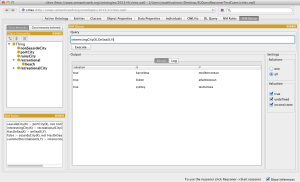Difference between revisions of "NoHR"
From Protege Wiki
(Created page with "{{Plugin |Description=NoHR (Nova Hybrid Reasoner) is a plug-in for Protégé that allows its users to query knowledge bases composed of an ontology in OWL 2 EL and a set of Re...") |
|||
| Line 8: | Line 8: | ||
|ForApplication2=Protege-OWL 4.2 | |ForApplication2=Protege-OWL 4.2 | ||
|ForApplication3=Protege-OWL 4.3 | |ForApplication3=Protege-OWL 4.3 | ||
| − | |Screenshot= | + | |Screenshot=NoHRscrshot.png |
|HomepageURL=http://centria.di.fct.unl.pt/nohr/ | |HomepageURL=http://centria.di.fct.unl.pt/nohr/ | ||
|DeveloperID1=Vadim Ivanov | |DeveloperID1=Vadim Ivanov | ||
Revision as of 18:08, October 24, 2013
NoHR
NoHR (Nova Hybrid Reasoner) is a plug-in for Protégé that allows its users to query knowledge bases composed of an ontology in OWL 2 EL and a set of Reasoning Rules.
Using a top-down reasoning approach, which means that only the part of the ontology and rules that is relevant for the query is actually evaluated, NoHR combines the capabilities of ELK for OWL 2 EL and the rule engine XSB Prolog to deliver very fast interactive response times.
Contents
[hide]Versions & Compatibility
This section lists available versions of NoHR.
| Version | Compatible with | Dependencies |
|---|---|---|
| NoHR 2.0.0 | Protege-OWL 5.0.0 | XSB Prolog |
| NoHR 1.0.0 | Protege-OWL 4.3 | XSB Prolog |
If you click on the button below to add a new version of NoHR, you will be asked to define a page title for the new version. Please adhere to the naming convention of NoHR X.X.X when you define the new page!
Changelog
| Version | Changes in this version |
|---|---|
| NoHR 2.0.0 | Complete revamp for performance improvements, new support of the OWL 2 QL profile in addition to OWL 2 EL, and a new rule parser for improved rule edition and querying. |
| NoHR 1.0.0 | Initial Release of NoHR for querying combinations of OWL 2 EL ontologies (as admitted in the ELK 0.4.0 libraries) and non-monotonic rules in an easy-to-read declarative rule language. |
